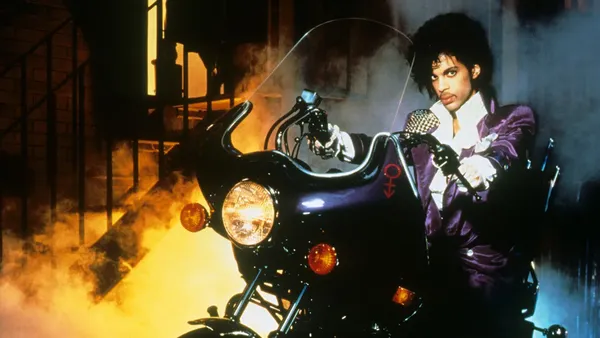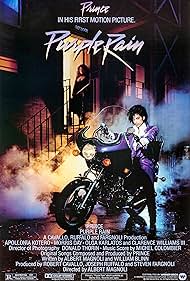Eye For Film >> Movies >> Purple Rain (1984) Film Review
Purple Rain
Reviewed by: Jennie Kermode

Few musicians have ever made as much impact on the world as Prince, who dedicated most of his life to composing and reportedly still has thousands of songs unreleased. Like many successful musicians, he also took an interest in film, but unlike most, he didn’t take his ability to succeed in that field for granted. He was well prepared when taking the plunge – and did his best to ensure that his musician co-stars were too. This is probably one of the reasons why Purple Rain, first released in 1984, has stood the test of time, and why it stands up as more than just an extended music video – as a piece of cinema worthy of respect in its own right.
It is not, of course, an uncontroversial piece of cinema, but that is perhaps because of the expectations that many viewers go in with. Films about rock stars usually position them as heroes progressing through morally simple stories. Like Prince’s lyrical work, Purple Rain goes looking for challenges and takes on complex characters. It focuses on a young musician call the Kid (played by Prince himself, of course) who comes from a troubled home where his father beats his mother, and escapes this by spending all his time focused on music. His position as a regular performer at his local club is under threat, however, with Apollonia (Apollonia Kotero), his sometimes girlfriend, set up by others to become his rival.

As his personal and professional lives collide, the Kid finds himself behaving in ways that remind him of his father. His insecurity and desire to be taken seriously push him into a toxic form of masculinity which also affects him more directly, stifling his creativity because he is unable to express the whole of who he really is. It will take a chance discovery to change this and, in the process, to change the way he understands his parents and the generational violence that has constrained his view of the world.
All of this is more significant than it might sound in view of the dearth of complex stories and characters available to represent Black Americans at the time. Like most socially experimental narratives, it’s not entirely successful, and many contemporary critics found its depictions of misogynistic abuse problematic. It was accused of stereotyping, but looked at more closely, the central characters have a lot of depth – in particular the Kid’s father (played by Clarence Williams III). Apollonia is a strong heroine who, despite the frame through which we see her, clearly has a direction of her own and isn’t about to put up with being pushed around by any man. Also significant is the presence of Wendy and Lisa (Wendy Melvoin and Lisa Coleman). Whilst their real life equivalents were already working closely with Prince, the Kid rejects their fictional versions because he doesn’t believe that women can be composers – another area in which he has a lesson to learn.
There is, of course, music throughout. The film is paired with the Purple Rain album, which contains several of Prince’s most iconic and overtly powerful works (albeit not his most sophisticated). The music and the costumes, as much as the narrative itself, reflect the musician’s own complex relationship with gender, and the Kid’s climactic stage number speaks to this in a way that remains as pertinent today as it was in 1984. It’s also a stunning performance, full of passion and energy, and all the more impressive on a big screen. Don’t miss the chance to see it in the cinema if you can.
Reviewed on: 05 Mar 2025

















